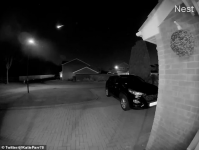A HUGE meteor lit up the sky over the UK on Sunday night.
The burning space rock looked just like a firework and was reported by around 120 Brits.
The UK Meteor Network described the meteor as a "fireball" and retweeted several videos caught on home doorbell cameras.
It came crashing through the atmosphere at about 9.55pm GMT on Sunday.
Sightings were reported from all over the UK including in Scotland and Somerset.
Amazed stargazers took to Twitter to share what they saw.
One told the UK Meteor Network: "I saw this in Manchester! Incredible!!!!!"
Another said: "I saw one as i was taking my recycling bin out and that was about 9.55pm and I live in Slough, Berkshire."
Others described spotting what they thought was a firework and some people even reported hearing an explosion.
The space rock would have burnt up as it entered our atmosphere and this created the streak of light behind it.
Meteors fall over the planet everyday but not all of them create such a big fireball spectacle.
They also often fall over the sea or uninhabited land so can go undetected.
Some people have reported spotting what they think are meteorite fragments in their gardens in England.
The burning space rock looked just like a firework and was reported by around 120 Brits.
The UK Meteor Network described the meteor as a "fireball" and retweeted several videos caught on home doorbell cameras.
It came crashing through the atmosphere at about 9.55pm GMT on Sunday.
Sightings were reported from all over the UK including in Scotland and Somerset.
Amazed stargazers took to Twitter to share what they saw.
One told the UK Meteor Network: "I saw this in Manchester! Incredible!!!!!"
Another said: "I saw one as i was taking my recycling bin out and that was about 9.55pm and I live in Slough, Berkshire."
Others described spotting what they thought was a firework and some people even reported hearing an explosion.
The space rock would have burnt up as it entered our atmosphere and this created the streak of light behind it.
Meteors fall over the planet everyday but not all of them create such a big fireball spectacle.
They also often fall over the sea or uninhabited land so can go undetected.
Some people have reported spotting what they think are meteorite fragments in their gardens in England.





